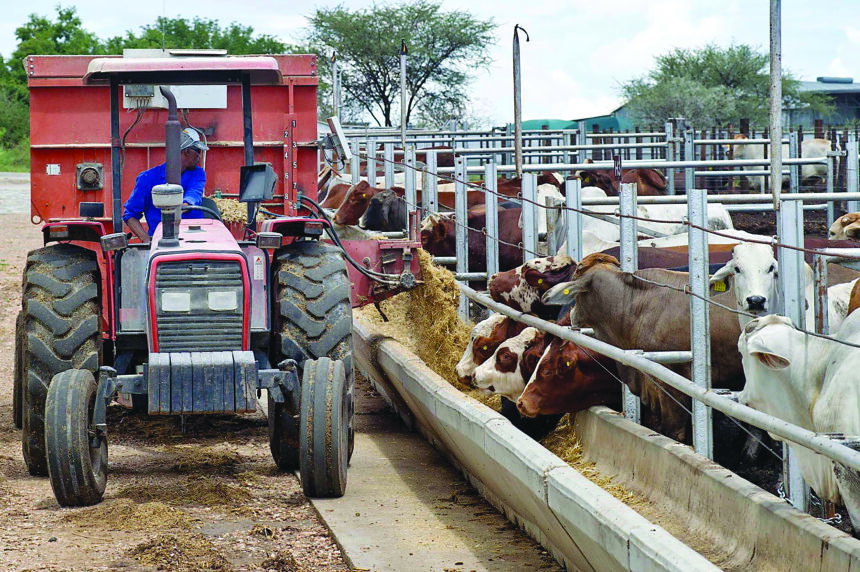Lahja Nashuuta
Resettled farmers in the Otjozondjupa, Omaheke, Kunene and Erongo regions are calling for an increase in funding from Agribank.
They claim that the current funding arrangement of N$200 000 for resettled farmers is insufficient to expand their agricultural operations.
Additionally, the farmers in the four regions are demanding a more comprehensive support. This includes improved access to financial resources, land security through title deeds and improved law-enforcement to protect their livelihoods and ensure the long-term success of the resettlement programme. These requests were presented in a report by the Parliamentary Standing Committee on Natural Resources, following visits to resettlement farms in these Otjozondjupa, Omaheke, Kunene and Erongo regions.
The purpose of these visits was to assess the effectiveness of the current funding model, explore how resettled farmers access financing for expansion, and evaluate the impact of government policies supporting these farmers. Currently, resettled farmers are eligible to apply for up to N$200 000 from Agribank’s funding scheme at a 4% interest rate. However, farmers are requesting that this amount be increased to at least N$1 million to allow them to scale up their businesses to tap into mainstream markets.
In addition, the farmers feel that the government’s resettlement policy should be amended to enable them to receive title deeds to the lands they are resettled on.
This will allow them to use it as collateral for loans from State and private financial institutions.
The report states that “lease agreements currently offered to resettled farmers cannot be used as collateral to access loans from financial institutions”.
Furthermore, farmers are demanding the introduction of a quota system for young people in the resettlement programme to address their under-representation in farming activities.
Touching on the proposed N$1 million increment in funding to resettled farmers, Agribank spokesperson Fillemon Nangonya stated that the proposed adjustments to the current funding module are feasible, as long as they have the government’s approval.
“As an implementing agency for the government’s resettlement programme, Agribank’s role is to execute decisions – not to make them. Therefore, whether there is an increase or no change in the funding amount, that is totally not up to us, but the government, based on its budgetary provisions.
“If they decide it should be N$500 000 or N$1 million, it’s our responsibility to implement that decision, which also comes with the necessary supporting measures,” he stated. Nangonya urged farmers who are facing financial challenges or struggling with their loan repayments to reach out to the bank for payment restructuring.
“We urge farmers who have commitments with Agribank to honour their repayments. Doing so ensures the bank’s sustainability. This, in turn, allows us to continue lending to other farmers. “More and more farmers are approaching us for loans – whether to stock up, repair infrastructure or expand their farming operations. However, we can only accommodate these requests if current borrowers fulfil their commitments,” he added. “We are aware that this year, most areas of the country have experienced above-average rainfall. We encourage farmers to stay dedicated to their work, and ensure the productivity of their farms,” Nangonya said.
Mixed challenges
The committee also identified bush encroachment as a significant challenge for most farmers on resettlement farms.
This is because it affects their animals’ grazing space and rangeland ability.
This issue, which reduces the carrying capacity of farmland in most of the visited areas, continues to affect the operations of many resettled farmers and de-bushing.
This, the farmers said, is a necessary but costly process, which is beyond their financial reach. Another concern raised by farmers was stock theft, particularly at Queen Sofia, where the absence of a nearby police station makes it difficult to report theft promptly.
To mitigate this, the committee recommended that the Ministry of Home Affairs, Immigration, Safety and Security expedites the construction of police stations or satellite stations at strategic locations to reduce theft. In their engagements with the committee, the farmers were advised to establish neighbourhood watch initiatives to complement law enforcement efforts in protecting their properties.
Farmers expressed frustration over the lack of access to markets for their produce, and uncontrolled imports that are driving down income from their products.
In some instances, farmers have been forced to donate their produce due to market oversaturation.
The committee has proposed the introduction of a monitoring mechanism for the resettlement programme, alongside the enforcement of punitive measures for farmers who fail to be productive or violate regulations, such as sub-leasing farming units to private individuals.
“This would ensure that farmers who receive support are held accountable for their productivity and adherence to the rules of the resettlement programme,” the report further reads.


